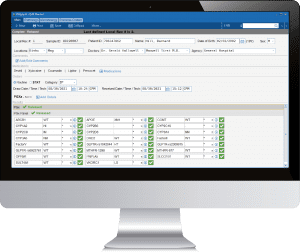
What is a Laboratory Information System
A laboratory information system (LIS) is a computer software that processes, stores and manages data to complete tests and orders. Lab managers use LIS systems to improve their daily lab workflow. This reduces the amount of human resources necessary to complete orders and increases accuracy of testing. LIS software improves tracking of lab inventory and throughput of testing for a variety of testing departments including, hematology, pharmacogenomics, toxicology, chemistry, pathology, immunology, microbiology, and more.


Laboratory Information System’s Functionality
A laboratory information system allows your lab to digitally record, manage, and store data collected during the testing cycle. The LIS system can be connected to other parts of your lab to automatically perform actions that would normally require a technician to perform. In essence, these actions include collecting data from instruments, sending data to an EHR, tracking orders, creating reports, sending orders to analyzers, recording quality control data and more. In the long run, having an LIS increases the potential output of production that your lab can handle.
See our Introduction to Laboratory Information Systems guide for more information.
Why Are Laboratory Information Systems Important?
Laboratory information systems reduce the amount of time and resources needed to complete each order in a lab. Without the ability of automation, all tasks are done by hand through paper systems. When compared to LIS systems, laboratories that use paper systems are significantly slower and require more labor to perform tests. Due to more steps in the testing process that are performed by humans, paper systems increase the chance of error. For this reason LIS systems have become essential to the laboratory testing process.
Laboratory information systems are a great way to reduce the amount of labor that is necessary to complete tasks and allow a laboratory to complete more tests per day. Additionally, LIS systems ensure positive patient identification so that laboratories can safely take on higher volumes without misidentifying patients. In todays testing climate, they play a key role in decreasing errors, improving workflows, meeting quality control standards, and improving patient care in the modern laboratory.
What Is The Difference Between LIS and LIMS?
A laboratory information management system (LIMS) allows for the lab to track de-identified specimen data, typically in research labs, rather than track patients. In other words, these LIMS systems are used in facilities that require visualization of large amounts of de-identified specimen data to help them answer questions pertaining to their research. LIMS systems also typically have difficulty directly interfacing devices. Conversely, LIS systems can directly interface devices together.
By comparison, a laboratory information system (LIS) allows for the lab to track data. These systems are used in clinical laboratory settings to track data to associated patients. They uniquely track a patient’s encounter with the laboratory and notify associated healthcare providers of critical health data. Another key function of the LIS systems is automated data collection and data sharing. This allows data to be automatically transferred from a device to the LIS system and applied to a patient’s record without the need for manual intervention from a laboratory technician.
Why Choose Comp Pro Med’s Polytech LIS?
Comp Pro Med’s Polytech LIS is the most comprehensive LIS software on the market. We provide a flexible solution that has integrated labs together for over 40 years. We have a dedicated support team that can get your lab up and running within 48 hours.
Comp Pro Med helps improve efficacy, reduce errors, and enhance integration for labs through automation. We bring a LIS flexible system to the table and lab support. Our team brings over 40 years of experience of running and maintaining laboratories that we can work together to create an LIS that works best for your lab.
